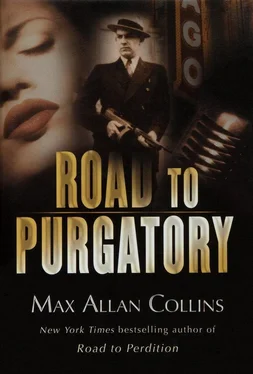“And of course, Mr. Capone lives here.”
“Al lives here. And I guess you know the rules, where Al’s concerned.”
“I’ve been told not to bother him. Keep my distance.”
“He’s uncomfortable with anybody but family. Even the guards keep ten feet or more away.”
“Really.”
Mimi nodded. “Al’s a cheerful man. Always has been good-natured. But he came out of prison... fearful. You know anything about Alcatraz?”
“Just that it’s on a rock near Frisco.”
“It was designed for only the most famous inmates. Sort of an all-star prison team... and some of those guys are psychos — sick, warped fucks. Al got beat up, more than once. There were attempts on his life.”
“A man in his position makes enemies.”
Mimi shook his head, in disgust. “These weren’t enemies — just assholes wanting to take the biggest man in America down. And enhance their own stupid reputations.”
“Must’ve been hard on your brother.”
“You quote me, Mike, I’ll deny it... but Al’s jumpy. Nervous. His greatest fear is some enemy out of his past will come over those walls and... I don’t know what.”
Michael was already “over” that wall. “You trust your security force, Mimi?”
“I do. About half of ’em worked for Paul Ricca back home, you know — and the Waiter ran the toughest crew in Chicago.”
Apparently Mimi Capone was unaware of the suspected Ricca takeover.
“What kind of alarm system do you have?”
“Nothing — just a yappin’ terrier that belongs to Muriel. And the mutt’s gone, went on vacation with ’em.”
“Mr. Capone’s room isn’t wired or anything?”
“No. No need. We’ve got strength in numbers. Firepower.”
“You do indeed.”
“Security on Palm Island is my job,” Mimi said, puffing his chest out. “And I take pride in it. I love my brother. I wouldn’t let anything happen to him.”
“I hope you don’t feel I’m trying to undermine you, in any way.”
“Not at all! Frank has a right to check us out before a meet. That was a good catch, those awnings... Ready for the nickel tour, inside?”
The house had fourteen rooms, not counting four baths and a glass-enclosed sun porch. The living room was to the right as you entered, a banistered stairway to a landing opposite the front door; at left a dining room beckoned.
A large-as-life painting of a somberly attired Capone and a similarly dressed young boy (his son, at a tender age?) loomed from over the fireplace of a cavernous living room. The simple Mission style of the house, with its graceful arches, seemed at odds with the tasteless array of obviously expensive Louis XIV furnishings, complete with scrolls, curved armrests, and golden ornamental motifs. The over-upholstered, massive chairs and couches added to the aura of tacky opulence.
“I decorated this myself,” a lilting female voice said from beside Michael. Was that a hint of brogue...?
“It’s lovely,” Michael said, turning to the tall, slim woman who had deposited herself at his side.
The beaming interior decorator responsible for this ghastly living room was as charming as it wasn’t; she had big blue sparkling eyes, platinum blonde hair brushing her shoulders, and pert, pretty features. At first glance Michael thought the woman might be in her thirties, but on closer examination, more like midforties.
“You must be Michael Satariano,” she said, offering a small slender hand bearing a big fat diamond. “Mae Capone. We’re so pleased to have you with us.”
Michael knew nothing about Mrs. Capone — the gangster had worked hard to keep his wife out of the limelight — and wondered if this striking woman had once been a chorus girl.
“You have a beautiful home,” he told her.
“I’m about ready to remodel,” she said, hands on hips, surveying the living room; she wore a simple blue-and-white floral-print dress with a white belt and white shoes. “I think I overdid it, buying all this junk when we first moved in.”
“Oh, no, it’s—”
“Pretty gauche,” she said, and made a “click” in one cheek. She looked at him, head cocked, half-smirking. “You can take the girl outa Brooklyn, but you can’t take Brooklyn out of the girl.”
Only the accent that was bedeviling Michael wasn’t of the Brooklyn variety...
“Mimi,” she said, stepping out to address Michael’s tour guide, “would you go upstairs and see if Al needs anything? He hasn’t sent down for lunch.”
“Sure, Mae,” Mimi said, and scurried off.
She slipped her arm in Michael’s and gazed at him with those big blue eyes. “Did my brother-in-law offer you lunch?... He’s a peppy host, but dumber than Dagwood.”
Michael laughed at this unexpected (and accurate) observation, and said, “I haven’t eaten, but I have my own car. I can easily go and—”
She squeezed his arm and walked him toward the kitchen. “You’re our guest. It’s not every day we have a Congressional Medal of Honor winner within these walls.”
“Thank you, Mrs. Capone, but please don’t make a fuss over—”
She gave him a firm, friendly look. “You’re going to call me Mae, and I’m going to call you Michael. Agreed?”
“Agreed.”
The kitchen was spacious, modern, and very white — from the tile floor to the counters and cabinets and the latest appliances; at her direction, he sat at a white-and-black-flecked Formica table. Despite the newness of the surroundings, a pungent odor took him back to his childhood, and not the part spent with the Satarianos...
...corned beef and cabbage.
She provided a place mat, bread, iced tea with lemon, napkin, and silverware, quickly, efficiently; then served him up. She said she’d already eaten, but sat with him and had an iced tea, too.
“This is delicious,” Michael said, and it was. “I love corned beef and cabbage.”
“So does Al.”
“You made this yourself?”
She nodded. “Brownie cooks for the staff, but mostly I take care of Al’s meals.”
Midway through Michael’s meal, Mimi Capone came down to fetch a plate for Al.
When Mimi had again disappeared, Michael said, “May I ask you something, Mrs. Capone... Mae?”
“You’re my guest. And you’re a nice young man. I’m sure you won’t overstep.”
This was the first indication from Mae Capone that there were, in fact, boundaries.
“Are you... Irish?”
She laughed, a little waterfall of glee. “Yes, I’m Irish! Does that surprise a good Sicilian boy like you? That Al Capone would take a bride from the land of the bogs and the little people?”
“Frankly, yes.”
Her beautiful eyes took on a distant cast. “...That was Carroll Street, for you. The Italian and Irish neighborhoods kind of butted up against each other. And the Irish boys, well, they took forever to marry.”
Michael sipped his iced tea. “And the Italian boys got an earlier start?”
“Oh my, yes,” she said, and laughed again. “We were both twenty, Al and I... We’ve had a wonderful marriage — does that surprise you, me saying that?”
“No,” Michael said, unsteadily.
“My husband was a famous and generous man, when the world was his. And when things went another way — with the imprisonment that those hypocrites brought down upon him — well, I stood by my man, like any good wife, Italian or Irish or otherwise. And now, in his retirement, I’m with him still. He has no other nurse but me, you know.”
“Is Mr. Capone ill?”
She rose and took Michael’s dish and was clearing it in the sink, when she said, “Prison took a toll.” Then she returned and sat again. “But he’s still Al Capone. With his friend Frank, he controls Chicago. Even now.”
Читать дальше












